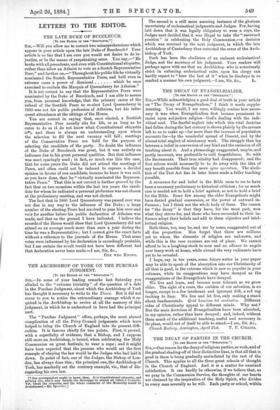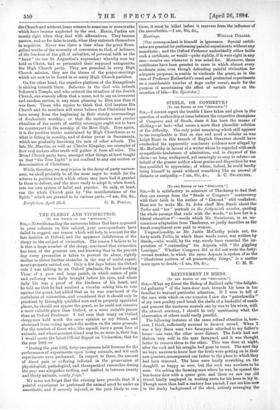THE DECAY OF PARTIES IN THE CHURCH.
[To THE EDITOR Or THY "SPECTATOR."]
Sia,—One reason for the decay of religions parties, as such, and of the gradual shading-off of their distinctive lines, is that all that is good in them is being gradually assimilated by the rest of the Church. This applies to all the three great schools of thought in the Church of England. And it is a matter for unmixed satisfaction. It can hardly be otherwise, if we believe that, as we pray in the Communion Service, the thoughts of our hearts are cleansed by the inspiration of the Holy Spirit, who divides to every man severally as he will. Each party or school, within.
the Church and without, bears witness to some one or more truths which have become neglected by the rest. Hence, Parties are mostly right when they deal with affirmatives. They become narrow, and so far false to truth, when they entrench themselves in negatives. Never was there a time when the great Evan- , gelical truths of the necessity of conversion to God, of holiness, of the freedom of the gift of salvation, of personal faith as the "hand " (to use St. Augustine's expression) whereby men lay hold on Christ, bad so permeated their supposed antagonists, the High Church party. They are preached in every High Church mission, they are the theme of the prayer-meetings which are now to be found in so many High Church parishes.
On the other hand, the negative platform of the Evangelicals is sinking beneath them. Believers in the God who indwelt Solomon's Temple, and who ordered the ritualism of the Jewish Church, can scarcely affirm that a mean, not to say an irreverent and careless service, is any more pleasing to Him now than it was then. Those who rejoice to think that God inspires His Church and its members will never believe that Christians have been wrong from the beginning in their stately surroundings of Eucharistic worship ; or that the instinctive and precise ritualism of the courts of earthly sovereigns ought not to have its counterpart in the worship of the Most High. Here again, it is the positive truths maintained by High Churchmen as to what is fitting in worship, and of divine power in Sacraments, which are gradually leavening the men of other schools. The late Mr. Maurice, as well as Charles Kingsley, are examples of how real seekers after truth will gather it from all sides. The Broad Church party have, amongst other things, at least taught us that " the True Light " is not confined to any one section or denomination of Christians.
While, therefore, we may rejoice in the decay of party narrow- ness, we shall probably be all the more eager to watch for the witness to positive truth which others may have had it granted to them to deliver, and the more ready to adopt it, when found, into our own system of belief and practice. So only, at least, can the whole Church gain by "the manifestations of the Spirit" which are granted to its various parts.—I am, Sir, &c.,



































 Previous page
Previous page